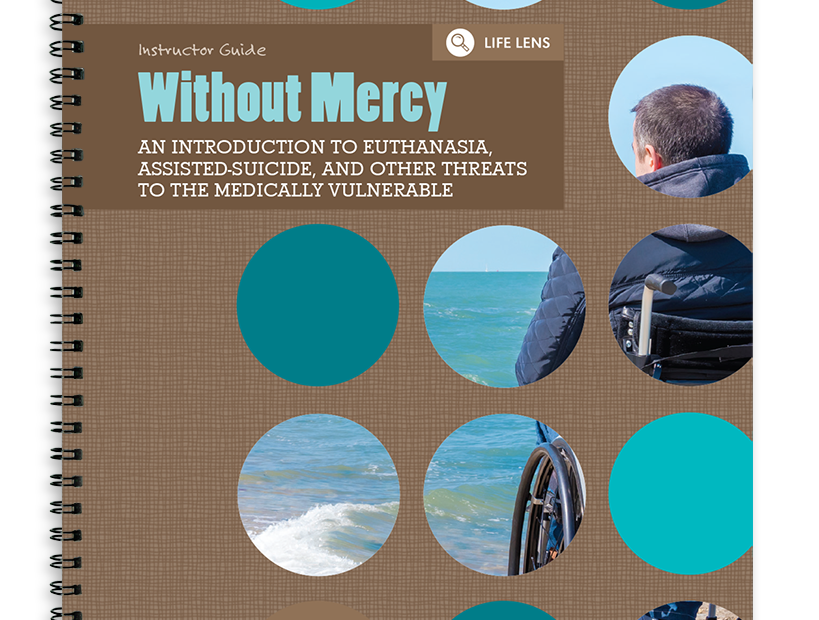By Susan Ciancio
Last month, Pope Francis spoke about euthanasia during his general audience, saying that the sick and dying need compassionate care, not euthanasia. He stated: “The right to care and treatment for all must always be prioritized, so that the weakest, particularly the elderly and the sick, are never discarded. Indeed, life is a right, not death, which must be welcomed, not administered. And this ethical principle applies to everyone, not just Christians or believers.”
Euthanasia—the intentional hastening of death of someone who’s sick, nearing death, or suffering from an illness or disability—is not only a grave sin but an offense to the person and to God.
Read any news site, and you’ll likely find stories advocating this “compassionate” killing. This attempt to tug on heartstrings is just another culture-of-death ploy that seeks to destroy the sanctity of life.
All human beings have value; that value is not earned. It cannot be taken away. It is inherent within us and does not diminish as a body gets older or sicker.
As our world trends toward more liberal views, it is imperative that people—especially the next generation—understand that all human beings are sacred and all life should be protected.
At the Culture of Life Studies Program, we understand this. That’s why we create lessons that discuss these difficult issues. To help combat the euthanasia mentality, we created a four-day lesson entitled Without Mercy: An Introduction to Euthanasia, Assisted Suicide, and Other Threats to the Medically Vulnerable. This high school lesson examines the complex topics of euthanasia and assisted suicide and teaches students the reality behind what the culture of death advocates regarding end-of-life issues.
Understanding this subject is vital for teens (and adults!). To help give you insight into what this important lesson covers, we have created a list of five reasons why Without Mercy will be an invaluable tool in combating the culture of death.
1) It is rooted in truth.
This lesson uses Church documents, the Catechism, and subject-matter experts to help your teens understand euthanasia. Expert and trusted insight will give them the tools they need to defend those teachings against current cultural attitudes and pro-euthanasia arguments.
2) It is thought-provoking.
We have included many thoughtful discussion and essay questions to help your students learn how to articulate their beliefs so that they can stand up for those who are vulnerable or nearing the end of their lives. Arming them with the facts and helping them understand the logic behind pro-life arguments will build the foundation they need as they develop the moral courage to stand up and defend life.
3) It uses case studies and real-life scenarios.
We do not want to speak in abstracts, so we use some examples of real people who suffered, who died, and even someone who came out of a coma after his family had been told it was impossible. These real cases will help your child understand that we all have dignity, no matter what happens with our health, and that we must never hasten death.
4) It explores and defines terms often used by the culture of death.
Students will learn the true meaning of terms such as “quality of life,” “death with dignity,” and “brain death” so that when they encounter them as they grow, they will be well equipped to combat pro-death arguments.
5) It teaches the redemptive value of suffering.
Suffering is something we cannot avoid. Though no one likes suffering, we can learn to unite our suffering with Christ’s on the cross, or we can offer up that suffering for someone else. This lesson will give your students a different perspective of suffering and will help them see that our suffering does not define us but that our response to it does.
It is incredibly important that we have discussions about morality and Church teaching with our children as they grow into adulthood. As parents, we are the first educators of our children. No matter where they go to school, it is our job to communicate the truths of the faith with them and to help them develop into faithful Catholics so that they can, one day, bring our culture back to a culture of life.
To order Without Mercy, visit culture-of-life-studies.myshopify.com/collections/life-lens/products/without-mercy-an-introduction-to-euthanasia-assisted-suicide-and-other-threats-to-the-medically-vulnerable.
